UK Banking System and Consumer Protection
VerifiedAdded on 2020/01/07
|10
|2585
|153
Essay
AI Summary
This assignment explores the UK's banking system, focusing on its stringent policies and how they contribute to enhanced safety. It also examines the robust consumer protection mechanisms implemented within the UK banking sector.
Contribute Materials
Your contribution can guide someone’s learning journey. Share your
documents today.
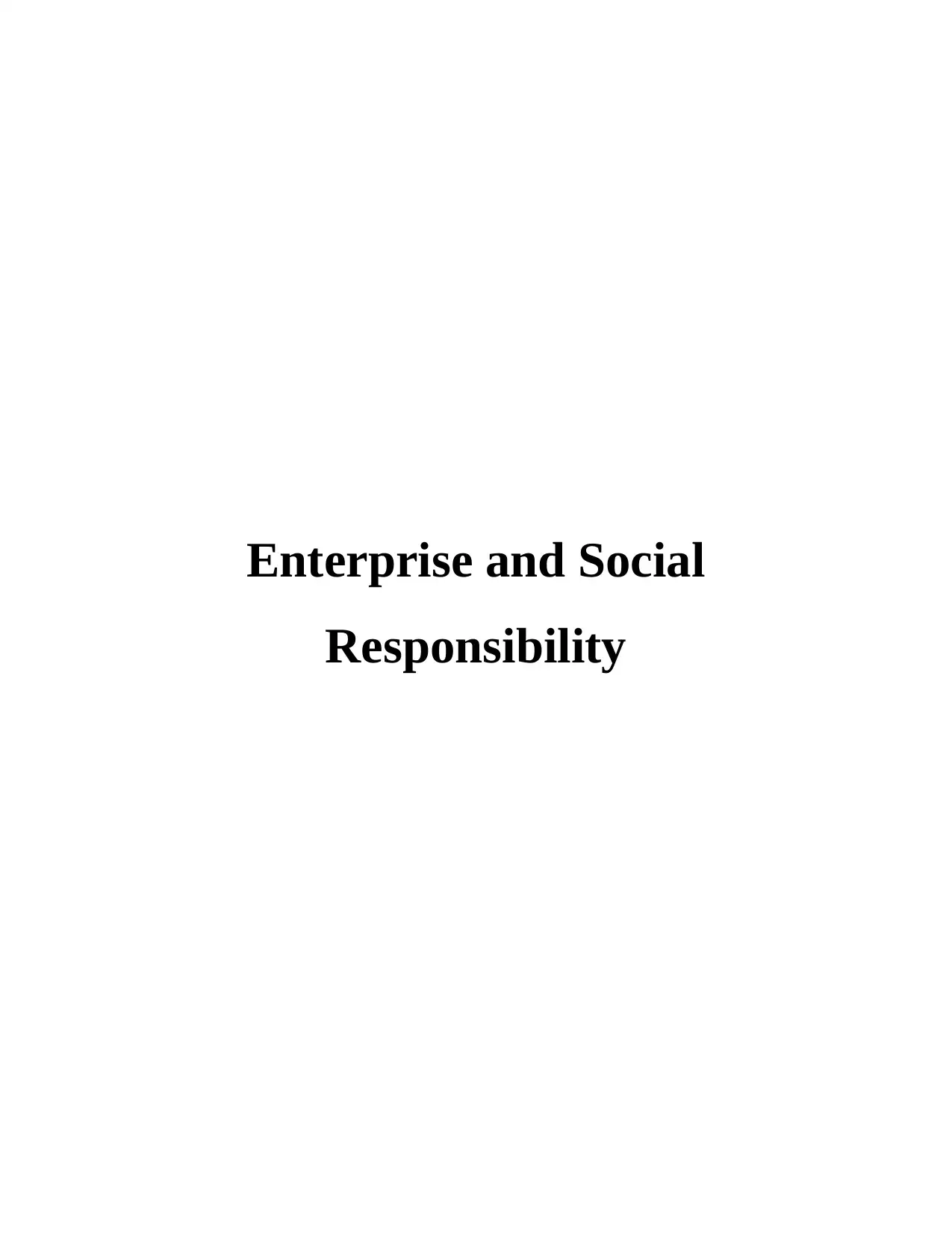
Enterprise and Social
Responsibility
Responsibility
Secure Best Marks with AI Grader
Need help grading? Try our AI Grader for instant feedback on your assignments.
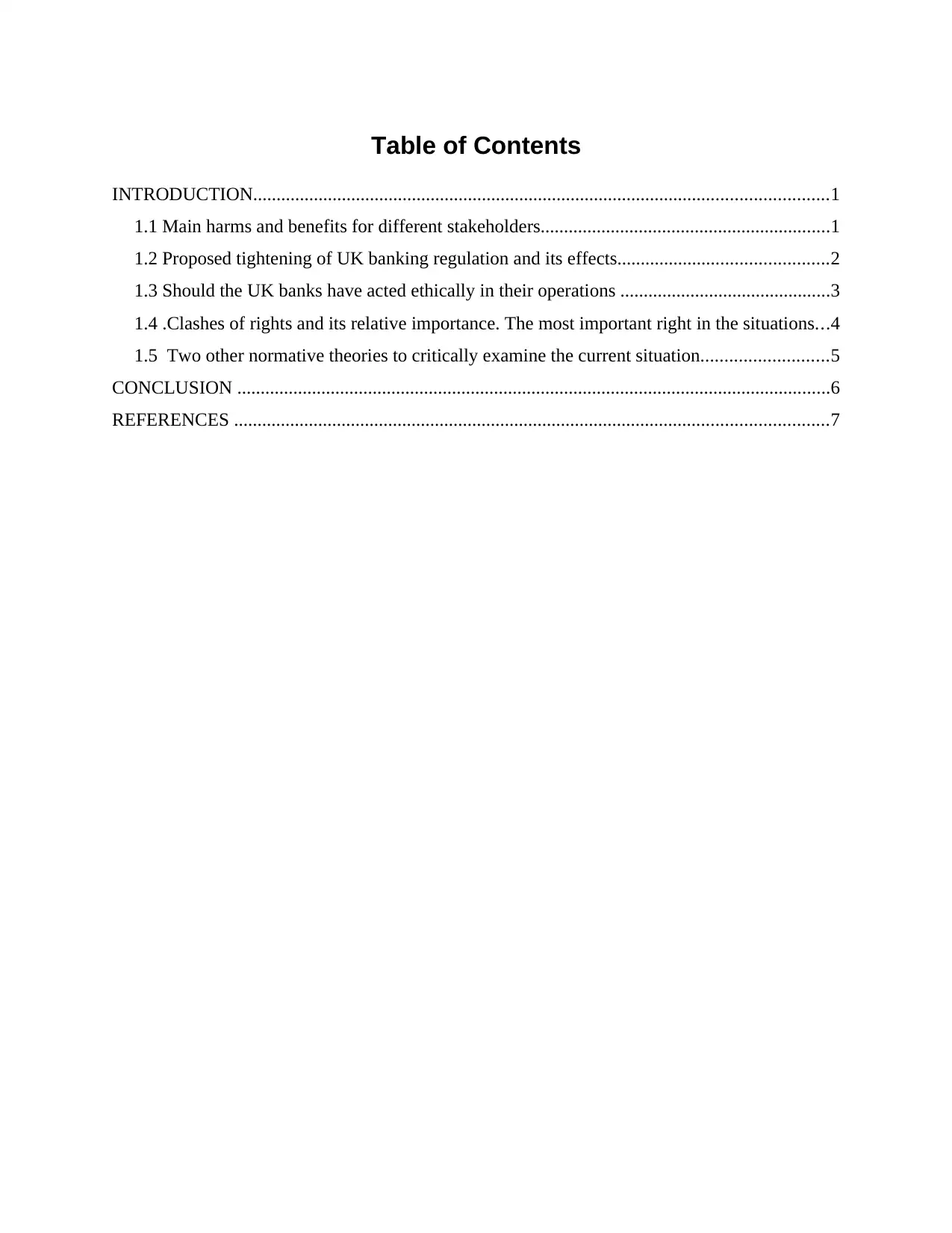
Table of Contents
INTRODUCTION...........................................................................................................................1
1.1 Main harms and benefits for different stakeholders..............................................................1
1.2 Proposed tightening of UK banking regulation and its effects.............................................2
1.3 Should the UK banks have acted ethically in their operations .............................................3
1.4 .Clashes of rights and its relative importance. The most important right in the situations...4
1.5 Two other normative theories to critically examine the current situation...........................5
CONCLUSION ...............................................................................................................................6
REFERENCES ...............................................................................................................................7
INTRODUCTION...........................................................................................................................1
1.1 Main harms and benefits for different stakeholders..............................................................1
1.2 Proposed tightening of UK banking regulation and its effects.............................................2
1.3 Should the UK banks have acted ethically in their operations .............................................3
1.4 .Clashes of rights and its relative importance. The most important right in the situations...4
1.5 Two other normative theories to critically examine the current situation...........................5
CONCLUSION ...............................................................................................................................6
REFERENCES ...............................................................................................................................7
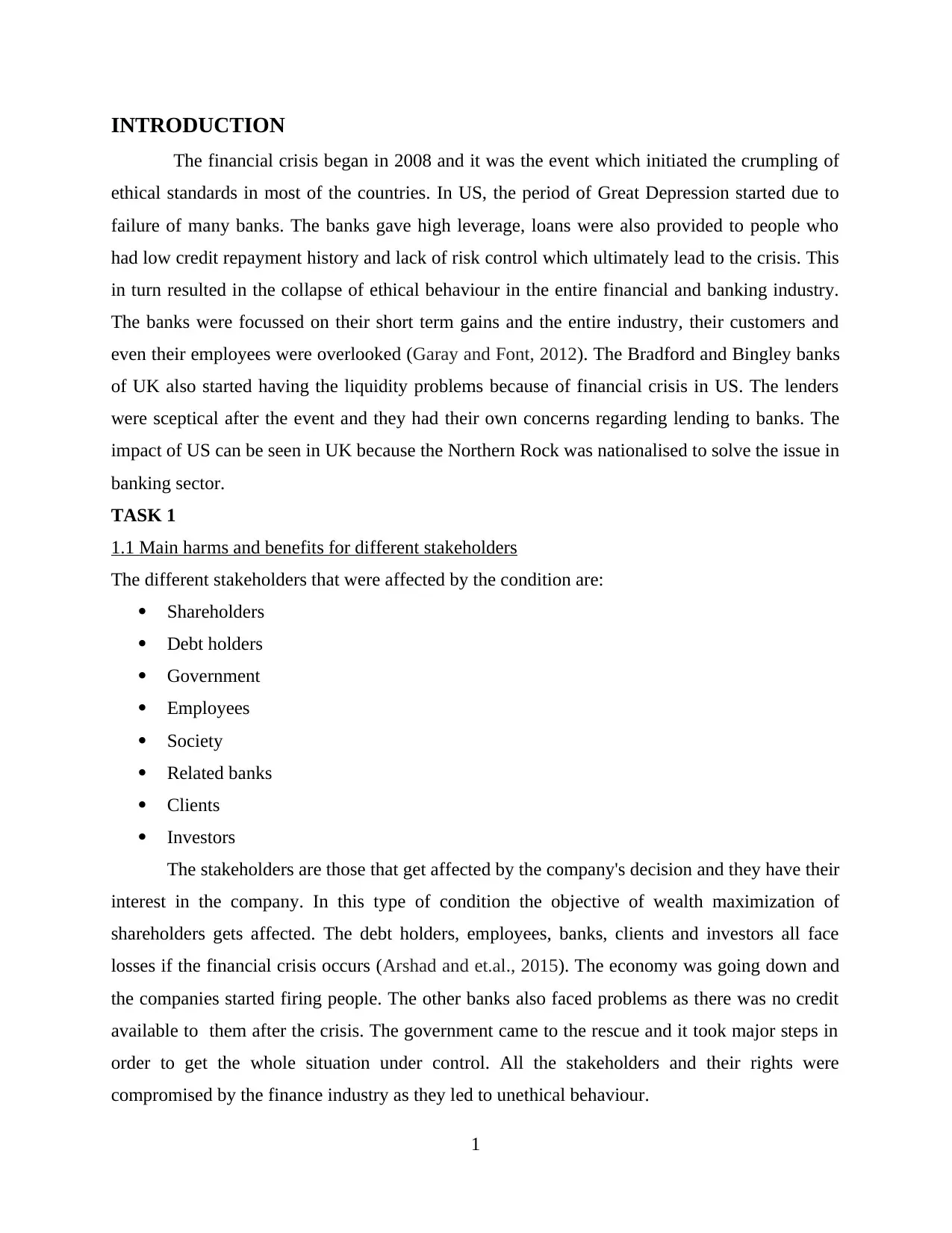
INTRODUCTION
The financial crisis began in 2008 and it was the event which initiated the crumpling of
ethical standards in most of the countries. In US, the period of Great Depression started due to
failure of many banks. The banks gave high leverage, loans were also provided to people who
had low credit repayment history and lack of risk control which ultimately lead to the crisis. This
in turn resulted in the collapse of ethical behaviour in the entire financial and banking industry.
The banks were focussed on their short term gains and the entire industry, their customers and
even their employees were overlooked (Garay and Font, 2012). The Bradford and Bingley banks
of UK also started having the liquidity problems because of financial crisis in US. The lenders
were sceptical after the event and they had their own concerns regarding lending to banks. The
impact of US can be seen in UK because the Northern Rock was nationalised to solve the issue in
banking sector.
TASK 1
1.1 Main harms and benefits for different stakeholders
The different stakeholders that were affected by the condition are:
Shareholders
Debt holders
Government
Employees
Society
Related banks
Clients
Investors
The stakeholders are those that get affected by the company's decision and they have their
interest in the company. In this type of condition the objective of wealth maximization of
shareholders gets affected. The debt holders, employees, banks, clients and investors all face
losses if the financial crisis occurs (Arshad and et.al., 2015). The economy was going down and
the companies started firing people. The other banks also faced problems as there was no credit
available to them after the crisis. The government came to the rescue and it took major steps in
order to get the whole situation under control. All the stakeholders and their rights were
compromised by the finance industry as they led to unethical behaviour.
1
The financial crisis began in 2008 and it was the event which initiated the crumpling of
ethical standards in most of the countries. In US, the period of Great Depression started due to
failure of many banks. The banks gave high leverage, loans were also provided to people who
had low credit repayment history and lack of risk control which ultimately lead to the crisis. This
in turn resulted in the collapse of ethical behaviour in the entire financial and banking industry.
The banks were focussed on their short term gains and the entire industry, their customers and
even their employees were overlooked (Garay and Font, 2012). The Bradford and Bingley banks
of UK also started having the liquidity problems because of financial crisis in US. The lenders
were sceptical after the event and they had their own concerns regarding lending to banks. The
impact of US can be seen in UK because the Northern Rock was nationalised to solve the issue in
banking sector.
TASK 1
1.1 Main harms and benefits for different stakeholders
The different stakeholders that were affected by the condition are:
Shareholders
Debt holders
Government
Employees
Society
Related banks
Clients
Investors
The stakeholders are those that get affected by the company's decision and they have their
interest in the company. In this type of condition the objective of wealth maximization of
shareholders gets affected. The debt holders, employees, banks, clients and investors all face
losses if the financial crisis occurs (Arshad and et.al., 2015). The economy was going down and
the companies started firing people. The other banks also faced problems as there was no credit
available to them after the crisis. The government came to the rescue and it took major steps in
order to get the whole situation under control. All the stakeholders and their rights were
compromised by the finance industry as they led to unethical behaviour.
1
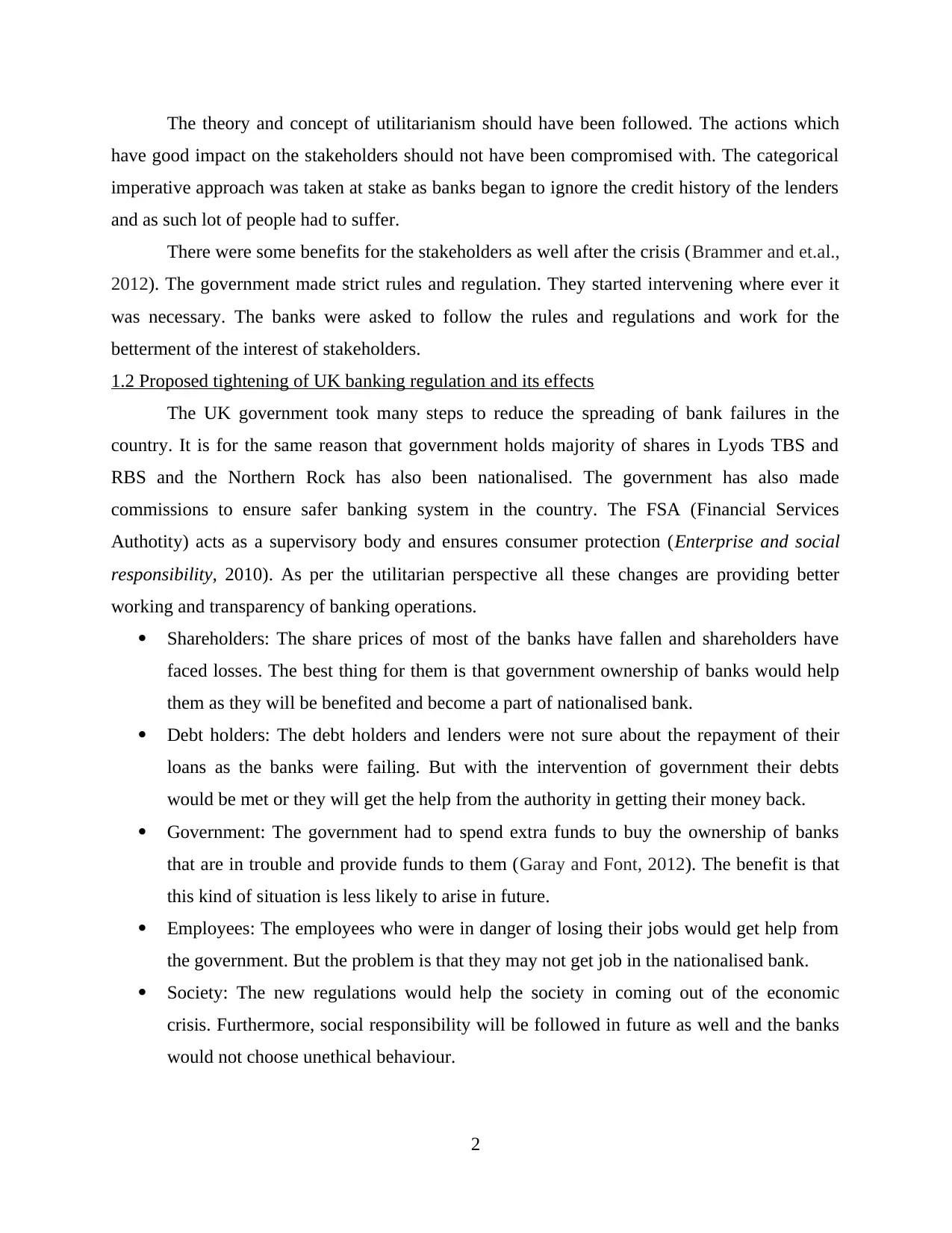
The theory and concept of utilitarianism should have been followed. The actions which
have good impact on the stakeholders should not have been compromised with. The categorical
imperative approach was taken at stake as banks began to ignore the credit history of the lenders
and as such lot of people had to suffer.
There were some benefits for the stakeholders as well after the crisis (Brammer and et.al.,
2012). The government made strict rules and regulation. They started intervening where ever it
was necessary. The banks were asked to follow the rules and regulations and work for the
betterment of the interest of stakeholders.
1.2 Proposed tightening of UK banking regulation and its effects
The UK government took many steps to reduce the spreading of bank failures in the
country. It is for the same reason that government holds majority of shares in Lyods TBS and
RBS and the Northern Rock has also been nationalised. The government has also made
commissions to ensure safer banking system in the country. The FSA (Financial Services
Authotity) acts as a supervisory body and ensures consumer protection (Enterprise and social
responsibility, 2010). As per the utilitarian perspective all these changes are providing better
working and transparency of banking operations.
Shareholders: The share prices of most of the banks have fallen and shareholders have
faced losses. The best thing for them is that government ownership of banks would help
them as they will be benefited and become a part of nationalised bank.
Debt holders: The debt holders and lenders were not sure about the repayment of their
loans as the banks were failing. But with the intervention of government their debts
would be met or they will get the help from the authority in getting their money back.
Government: The government had to spend extra funds to buy the ownership of banks
that are in trouble and provide funds to them (Garay and Font, 2012). The benefit is that
this kind of situation is less likely to arise in future.
Employees: The employees who were in danger of losing their jobs would get help from
the government. But the problem is that they may not get job in the nationalised bank.
Society: The new regulations would help the society in coming out of the economic
crisis. Furthermore, social responsibility will be followed in future as well and the banks
would not choose unethical behaviour.
2
have good impact on the stakeholders should not have been compromised with. The categorical
imperative approach was taken at stake as banks began to ignore the credit history of the lenders
and as such lot of people had to suffer.
There were some benefits for the stakeholders as well after the crisis (Brammer and et.al.,
2012). The government made strict rules and regulation. They started intervening where ever it
was necessary. The banks were asked to follow the rules and regulations and work for the
betterment of the interest of stakeholders.
1.2 Proposed tightening of UK banking regulation and its effects
The UK government took many steps to reduce the spreading of bank failures in the
country. It is for the same reason that government holds majority of shares in Lyods TBS and
RBS and the Northern Rock has also been nationalised. The government has also made
commissions to ensure safer banking system in the country. The FSA (Financial Services
Authotity) acts as a supervisory body and ensures consumer protection (Enterprise and social
responsibility, 2010). As per the utilitarian perspective all these changes are providing better
working and transparency of banking operations.
Shareholders: The share prices of most of the banks have fallen and shareholders have
faced losses. The best thing for them is that government ownership of banks would help
them as they will be benefited and become a part of nationalised bank.
Debt holders: The debt holders and lenders were not sure about the repayment of their
loans as the banks were failing. But with the intervention of government their debts
would be met or they will get the help from the authority in getting their money back.
Government: The government had to spend extra funds to buy the ownership of banks
that are in trouble and provide funds to them (Garay and Font, 2012). The benefit is that
this kind of situation is less likely to arise in future.
Employees: The employees who were in danger of losing their jobs would get help from
the government. But the problem is that they may not get job in the nationalised bank.
Society: The new regulations would help the society in coming out of the economic
crisis. Furthermore, social responsibility will be followed in future as well and the banks
would not choose unethical behaviour.
2
Secure Best Marks with AI Grader
Need help grading? Try our AI Grader for instant feedback on your assignments.
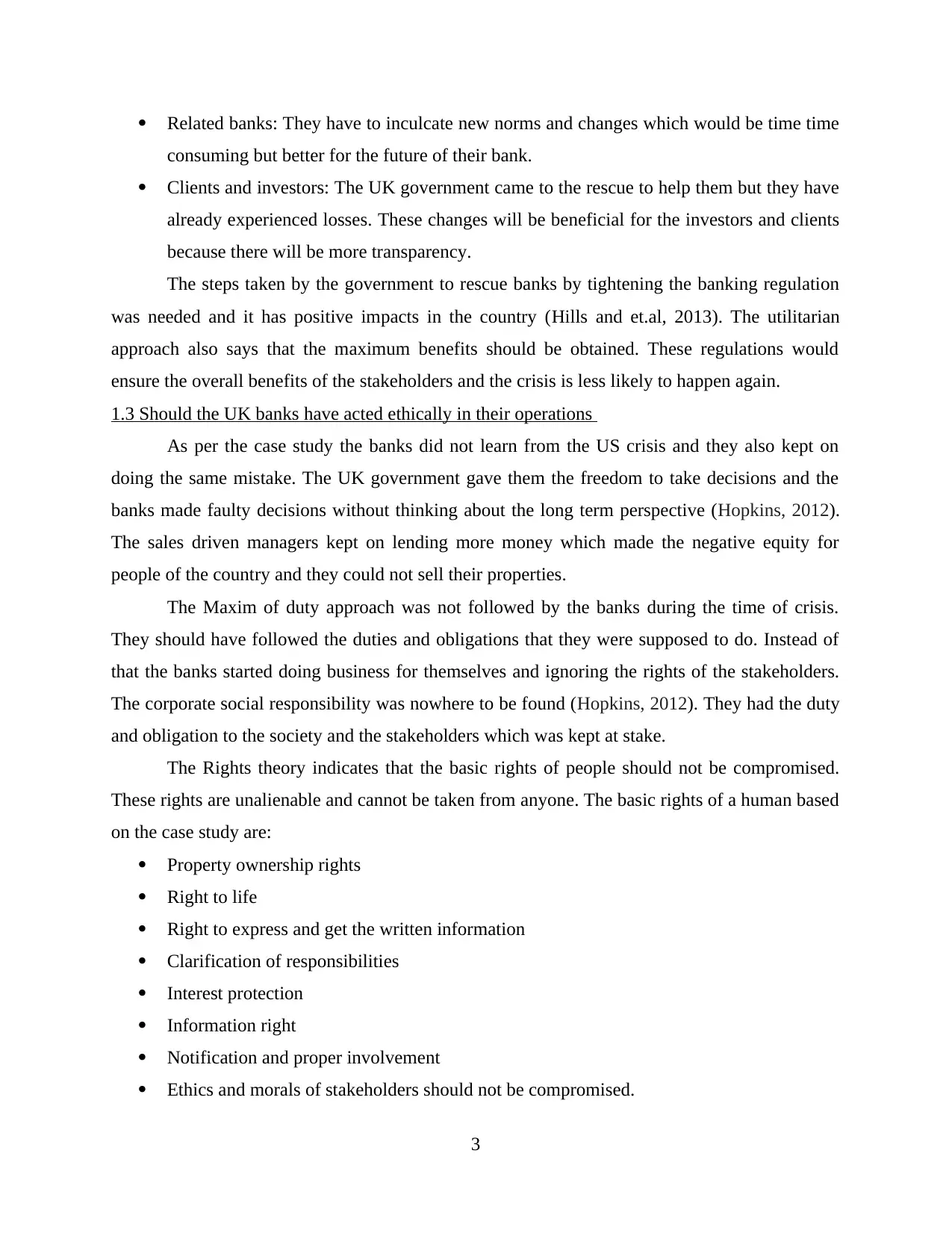
Related banks: They have to inculcate new norms and changes which would be time time
consuming but better for the future of their bank.
Clients and investors: The UK government came to the rescue to help them but they have
already experienced losses. These changes will be beneficial for the investors and clients
because there will be more transparency.
The steps taken by the government to rescue banks by tightening the banking regulation
was needed and it has positive impacts in the country (Hills and et.al, 2013). The utilitarian
approach also says that the maximum benefits should be obtained. These regulations would
ensure the overall benefits of the stakeholders and the crisis is less likely to happen again.
1.3 Should the UK banks have acted ethically in their operations
As per the case study the banks did not learn from the US crisis and they also kept on
doing the same mistake. The UK government gave them the freedom to take decisions and the
banks made faulty decisions without thinking about the long term perspective (Hopkins, 2012).
The sales driven managers kept on lending more money which made the negative equity for
people of the country and they could not sell their properties.
The Maxim of duty approach was not followed by the banks during the time of crisis.
They should have followed the duties and obligations that they were supposed to do. Instead of
that the banks started doing business for themselves and ignoring the rights of the stakeholders.
The corporate social responsibility was nowhere to be found (Hopkins, 2012). They had the duty
and obligation to the society and the stakeholders which was kept at stake.
The Rights theory indicates that the basic rights of people should not be compromised.
These rights are unalienable and cannot be taken from anyone. The basic rights of a human based
on the case study are:
Property ownership rights
Right to life
Right to express and get the written information
Clarification of responsibilities
Interest protection
Information right
Notification and proper involvement
Ethics and morals of stakeholders should not be compromised.
3
consuming but better for the future of their bank.
Clients and investors: The UK government came to the rescue to help them but they have
already experienced losses. These changes will be beneficial for the investors and clients
because there will be more transparency.
The steps taken by the government to rescue banks by tightening the banking regulation
was needed and it has positive impacts in the country (Hills and et.al, 2013). The utilitarian
approach also says that the maximum benefits should be obtained. These regulations would
ensure the overall benefits of the stakeholders and the crisis is less likely to happen again.
1.3 Should the UK banks have acted ethically in their operations
As per the case study the banks did not learn from the US crisis and they also kept on
doing the same mistake. The UK government gave them the freedom to take decisions and the
banks made faulty decisions without thinking about the long term perspective (Hopkins, 2012).
The sales driven managers kept on lending more money which made the negative equity for
people of the country and they could not sell their properties.
The Maxim of duty approach was not followed by the banks during the time of crisis.
They should have followed the duties and obligations that they were supposed to do. Instead of
that the banks started doing business for themselves and ignoring the rights of the stakeholders.
The corporate social responsibility was nowhere to be found (Hopkins, 2012). They had the duty
and obligation to the society and the stakeholders which was kept at stake.
The Rights theory indicates that the basic rights of people should not be compromised.
These rights are unalienable and cannot be taken from anyone. The basic rights of a human based
on the case study are:
Property ownership rights
Right to life
Right to express and get the written information
Clarification of responsibilities
Interest protection
Information right
Notification and proper involvement
Ethics and morals of stakeholders should not be compromised.
3
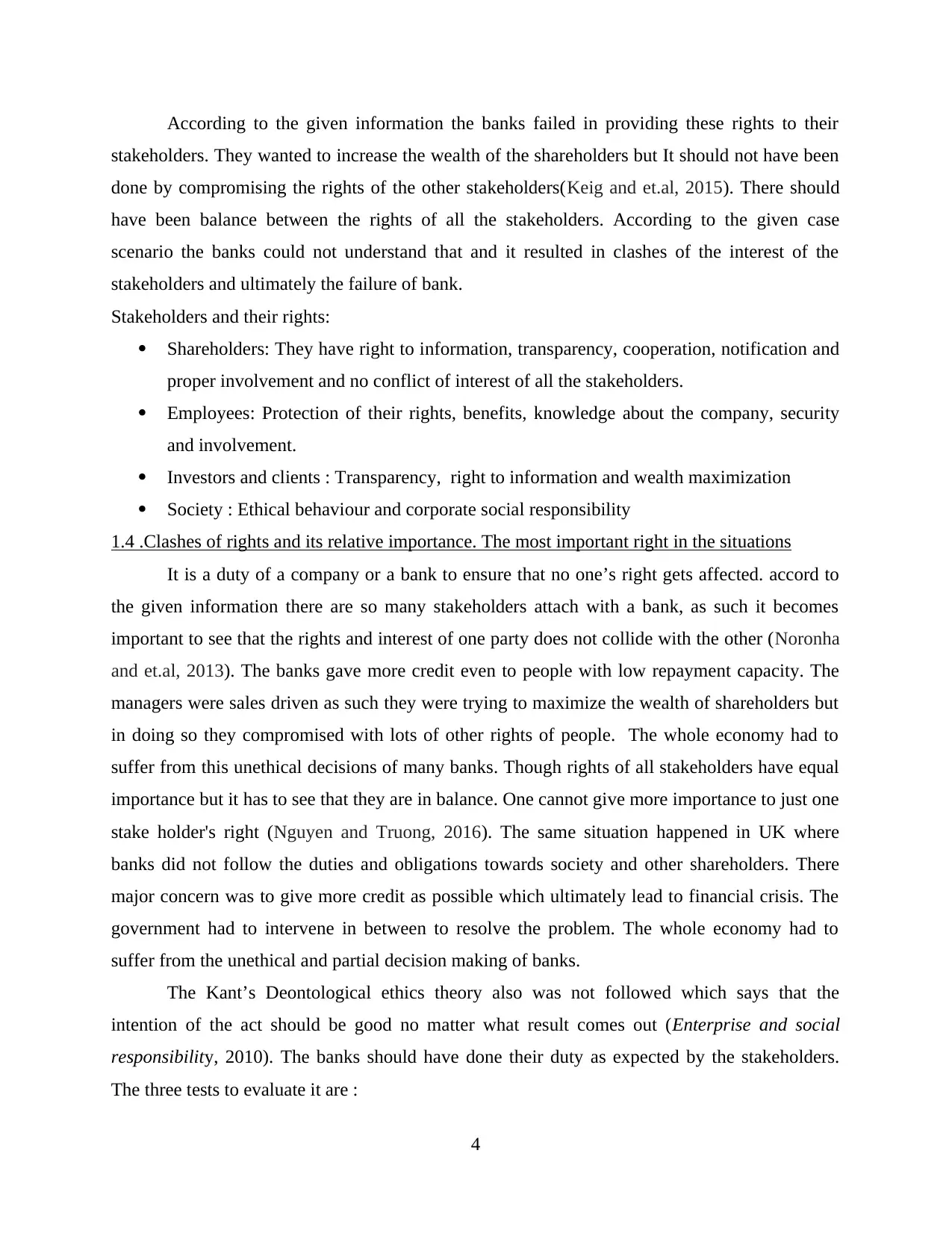
According to the given information the banks failed in providing these rights to their
stakeholders. They wanted to increase the wealth of the shareholders but It should not have been
done by compromising the rights of the other stakeholders(Keig and et.al, 2015). There should
have been balance between the rights of all the stakeholders. According to the given case
scenario the banks could not understand that and it resulted in clashes of the interest of the
stakeholders and ultimately the failure of bank.
Stakeholders and their rights:
Shareholders: They have right to information, transparency, cooperation, notification and
proper involvement and no conflict of interest of all the stakeholders.
Employees: Protection of their rights, benefits, knowledge about the company, security
and involvement.
Investors and clients : Transparency, right to information and wealth maximization
Society : Ethical behaviour and corporate social responsibility
1.4 .Clashes of rights and its relative importance. The most important right in the situations
It is a duty of a company or a bank to ensure that no one’s right gets affected. accord to
the given information there are so many stakeholders attach with a bank, as such it becomes
important to see that the rights and interest of one party does not collide with the other (Noronha
and et.al, 2013). The banks gave more credit even to people with low repayment capacity. The
managers were sales driven as such they were trying to maximize the wealth of shareholders but
in doing so they compromised with lots of other rights of people. The whole economy had to
suffer from this unethical decisions of many banks. Though rights of all stakeholders have equal
importance but it has to see that they are in balance. One cannot give more importance to just one
stake holder's right (Nguyen and Truong, 2016). The same situation happened in UK where
banks did not follow the duties and obligations towards society and other shareholders. There
major concern was to give more credit as possible which ultimately lead to financial crisis. The
government had to intervene in between to resolve the problem. The whole economy had to
suffer from the unethical and partial decision making of banks.
The Kant’s Deontological ethics theory also was not followed which says that the
intention of the act should be good no matter what result comes out (Enterprise and social
responsibility, 2010). The banks should have done their duty as expected by the stakeholders.
The three tests to evaluate it are :
4
stakeholders. They wanted to increase the wealth of the shareholders but It should not have been
done by compromising the rights of the other stakeholders(Keig and et.al, 2015). There should
have been balance between the rights of all the stakeholders. According to the given case
scenario the banks could not understand that and it resulted in clashes of the interest of the
stakeholders and ultimately the failure of bank.
Stakeholders and their rights:
Shareholders: They have right to information, transparency, cooperation, notification and
proper involvement and no conflict of interest of all the stakeholders.
Employees: Protection of their rights, benefits, knowledge about the company, security
and involvement.
Investors and clients : Transparency, right to information and wealth maximization
Society : Ethical behaviour and corporate social responsibility
1.4 .Clashes of rights and its relative importance. The most important right in the situations
It is a duty of a company or a bank to ensure that no one’s right gets affected. accord to
the given information there are so many stakeholders attach with a bank, as such it becomes
important to see that the rights and interest of one party does not collide with the other (Noronha
and et.al, 2013). The banks gave more credit even to people with low repayment capacity. The
managers were sales driven as such they were trying to maximize the wealth of shareholders but
in doing so they compromised with lots of other rights of people. The whole economy had to
suffer from this unethical decisions of many banks. Though rights of all stakeholders have equal
importance but it has to see that they are in balance. One cannot give more importance to just one
stake holder's right (Nguyen and Truong, 2016). The same situation happened in UK where
banks did not follow the duties and obligations towards society and other shareholders. There
major concern was to give more credit as possible which ultimately lead to financial crisis. The
government had to intervene in between to resolve the problem. The whole economy had to
suffer from the unethical and partial decision making of banks.
The Kant’s Deontological ethics theory also was not followed which says that the
intention of the act should be good no matter what result comes out (Enterprise and social
responsibility, 2010). The banks should have done their duty as expected by the stakeholders.
The three tests to evaluate it are :
4
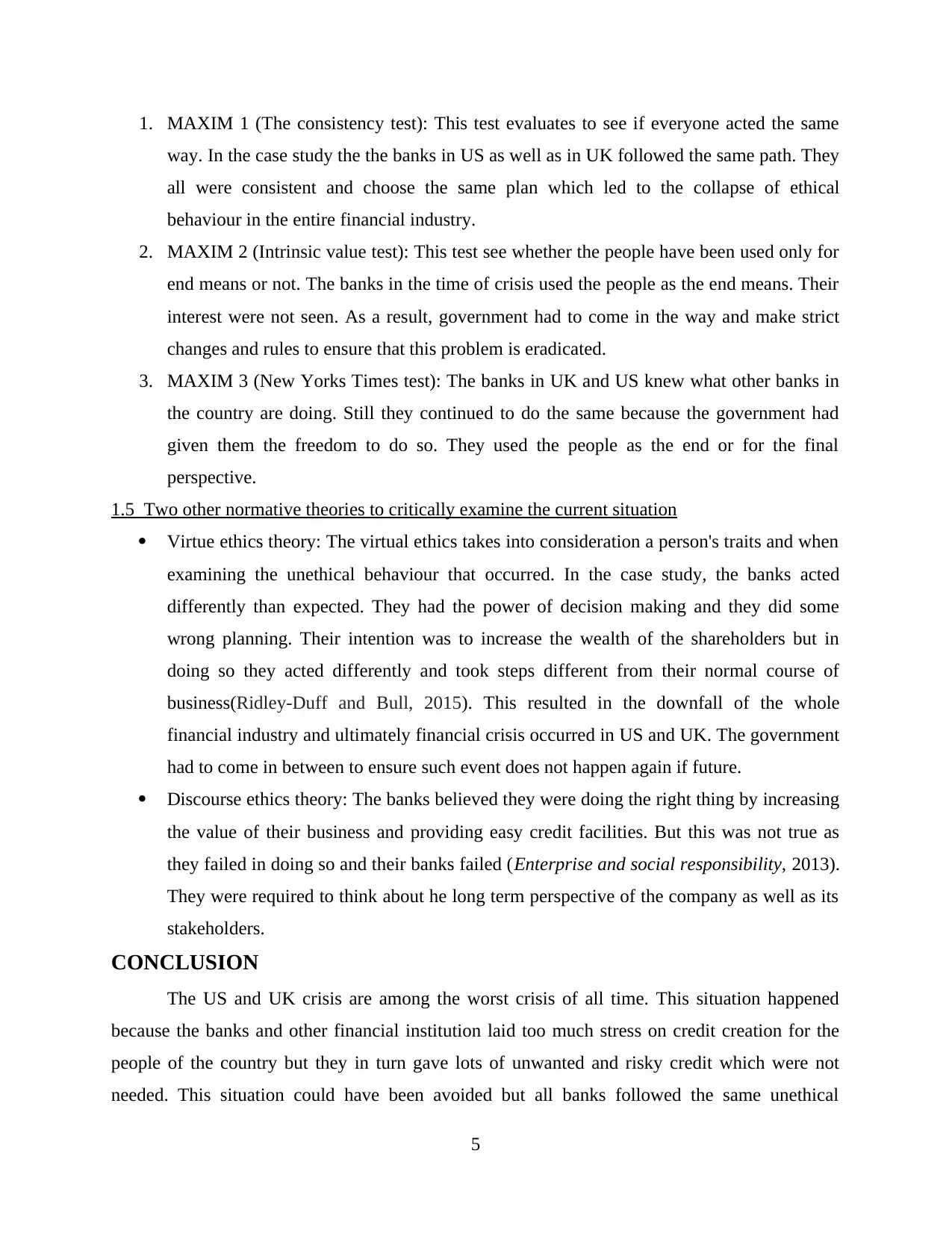
1. MAXIM 1 (The consistency test): This test evaluates to see if everyone acted the same
way. In the case study the the banks in US as well as in UK followed the same path. They
all were consistent and choose the same plan which led to the collapse of ethical
behaviour in the entire financial industry.
2. MAXIM 2 (Intrinsic value test): This test see whether the people have been used only for
end means or not. The banks in the time of crisis used the people as the end means. Their
interest were not seen. As a result, government had to come in the way and make strict
changes and rules to ensure that this problem is eradicated.
3. MAXIM 3 (New Yorks Times test): The banks in UK and US knew what other banks in
the country are doing. Still they continued to do the same because the government had
given them the freedom to do so. They used the people as the end or for the final
perspective.
1.5 Two other normative theories to critically examine the current situation
Virtue ethics theory: The virtual ethics takes into consideration a person's traits and when
examining the unethical behaviour that occurred. In the case study, the banks acted
differently than expected. They had the power of decision making and they did some
wrong planning. Their intention was to increase the wealth of the shareholders but in
doing so they acted differently and took steps different from their normal course of
business(Ridley-Duff and Bull, 2015). This resulted in the downfall of the whole
financial industry and ultimately financial crisis occurred in US and UK. The government
had to come in between to ensure such event does not happen again if future.
Discourse ethics theory: The banks believed they were doing the right thing by increasing
the value of their business and providing easy credit facilities. But this was not true as
they failed in doing so and their banks failed (Enterprise and social responsibility, 2013).
They were required to think about he long term perspective of the company as well as its
stakeholders.
CONCLUSION
The US and UK crisis are among the worst crisis of all time. This situation happened
because the banks and other financial institution laid too much stress on credit creation for the
people of the country but they in turn gave lots of unwanted and risky credit which were not
needed. This situation could have been avoided but all banks followed the same unethical
5
way. In the case study the the banks in US as well as in UK followed the same path. They
all were consistent and choose the same plan which led to the collapse of ethical
behaviour in the entire financial industry.
2. MAXIM 2 (Intrinsic value test): This test see whether the people have been used only for
end means or not. The banks in the time of crisis used the people as the end means. Their
interest were not seen. As a result, government had to come in the way and make strict
changes and rules to ensure that this problem is eradicated.
3. MAXIM 3 (New Yorks Times test): The banks in UK and US knew what other banks in
the country are doing. Still they continued to do the same because the government had
given them the freedom to do so. They used the people as the end or for the final
perspective.
1.5 Two other normative theories to critically examine the current situation
Virtue ethics theory: The virtual ethics takes into consideration a person's traits and when
examining the unethical behaviour that occurred. In the case study, the banks acted
differently than expected. They had the power of decision making and they did some
wrong planning. Their intention was to increase the wealth of the shareholders but in
doing so they acted differently and took steps different from their normal course of
business(Ridley-Duff and Bull, 2015). This resulted in the downfall of the whole
financial industry and ultimately financial crisis occurred in US and UK. The government
had to come in between to ensure such event does not happen again if future.
Discourse ethics theory: The banks believed they were doing the right thing by increasing
the value of their business and providing easy credit facilities. But this was not true as
they failed in doing so and their banks failed (Enterprise and social responsibility, 2013).
They were required to think about he long term perspective of the company as well as its
stakeholders.
CONCLUSION
The US and UK crisis are among the worst crisis of all time. This situation happened
because the banks and other financial institution laid too much stress on credit creation for the
people of the country but they in turn gave lots of unwanted and risky credit which were not
needed. This situation could have been avoided but all banks followed the same unethical
5
Paraphrase This Document
Need a fresh take? Get an instant paraphrase of this document with our AI Paraphraser
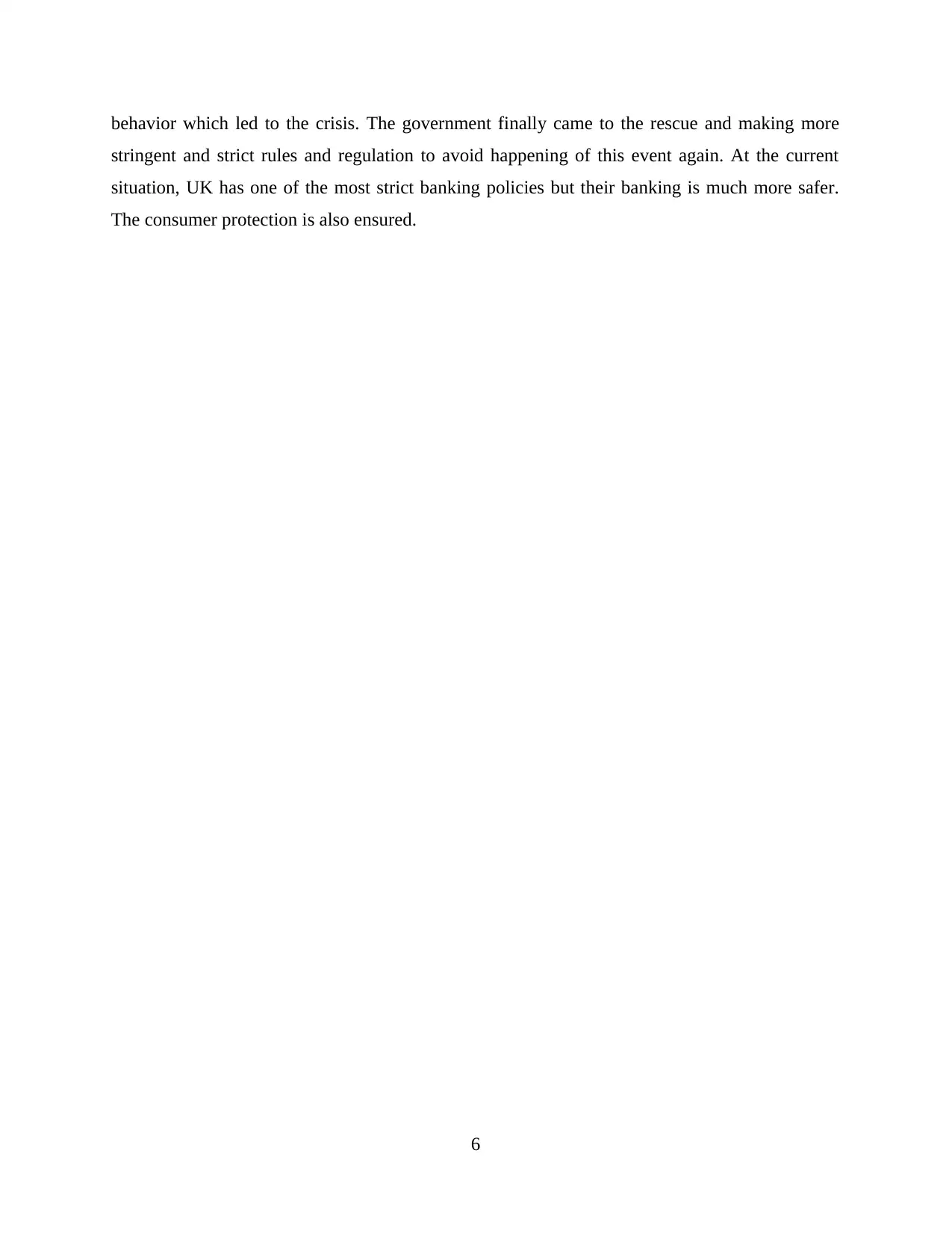
behavior which led to the crisis. The government finally came to the rescue and making more
stringent and strict rules and regulation to avoid happening of this event again. At the current
situation, UK has one of the most strict banking policies but their banking is much more safer.
The consumer protection is also ensured.
6
stringent and strict rules and regulation to avoid happening of this event again. At the current
situation, UK has one of the most strict banking policies but their banking is much more safer.
The consumer protection is also ensured.
6
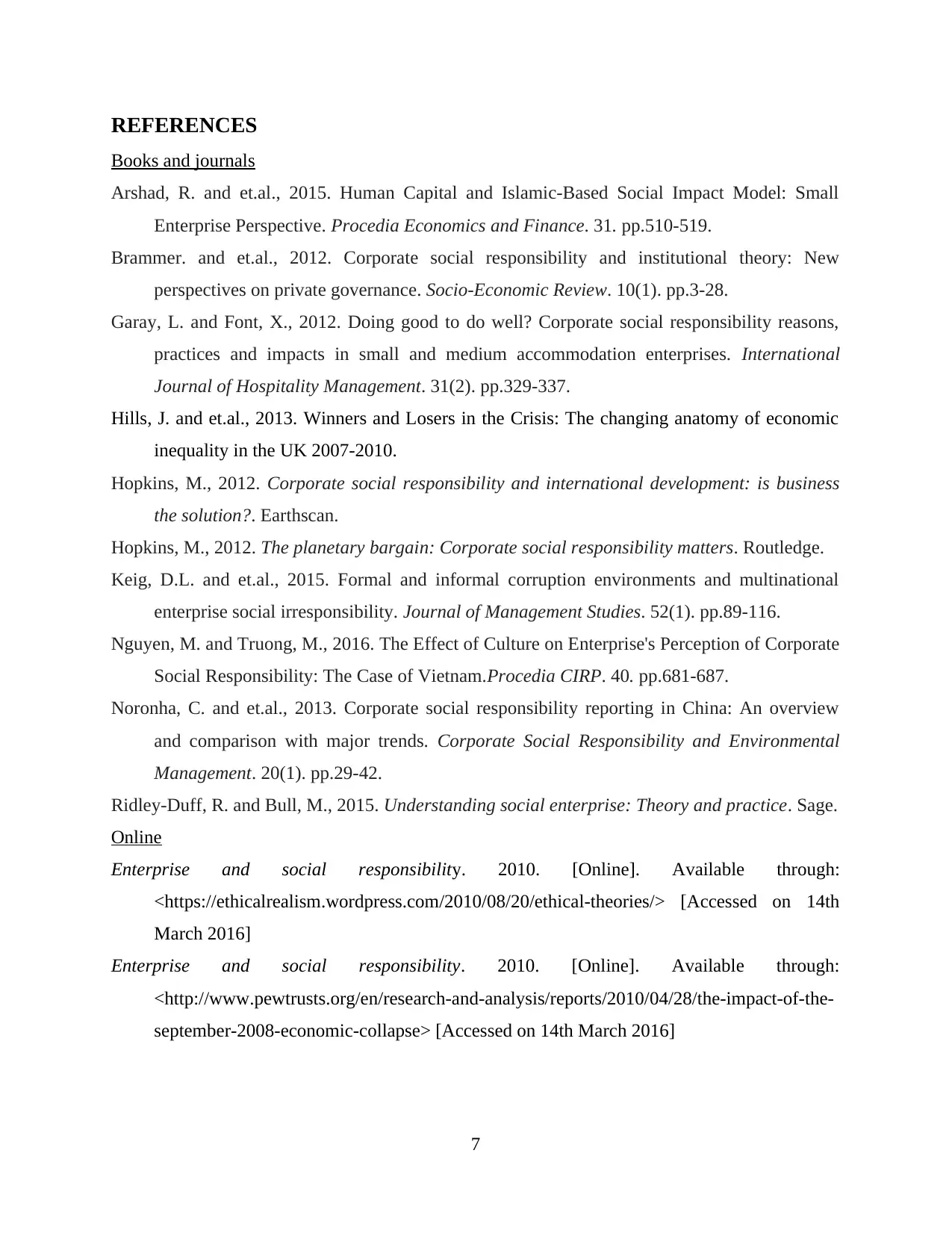
REFERENCES
Books and journals
Arshad, R. and et.al., 2015. Human Capital and Islamic-Based Social Impact Model: Small
Enterprise Perspective. Procedia Economics and Finance. 31. pp.510-519.
Brammer. and et.al., 2012. Corporate social responsibility and institutional theory: New
perspectives on private governance. Socio-Economic Review. 10(1). pp.3-28.
Garay, L. and Font, X., 2012. Doing good to do well? Corporate social responsibility reasons,
practices and impacts in small and medium accommodation enterprises. International
Journal of Hospitality Management. 31(2). pp.329-337.
Hills, J. and et.al., 2013. Winners and Losers in the Crisis: The changing anatomy of economic
inequality in the UK 2007-2010.
Hopkins, M., 2012. Corporate social responsibility and international development: is business
the solution?. Earthscan.
Hopkins, M., 2012. The planetary bargain: Corporate social responsibility matters. Routledge.
Keig, D.L. and et.al., 2015. Formal and informal corruption environments and multinational
enterprise social irresponsibility. Journal of Management Studies. 52(1). pp.89-116.
Nguyen, M. and Truong, M., 2016. The Effect of Culture on Enterprise's Perception of Corporate
Social Responsibility: The Case of Vietnam.Procedia CIRP. 40. pp.681-687.
Noronha, C. and et.al., 2013. Corporate social responsibility reporting in China: An overview
and comparison with major trends. Corporate Social Responsibility and Environmental
Management. 20(1). pp.29-42.
Ridley-Duff, R. and Bull, M., 2015. Understanding social enterprise: Theory and practice. Sage.
Online
Enterprise and social responsibility. 2010. [Online]. Available through:
<https://ethicalrealism.wordpress.com/2010/08/20/ethical-theories/> [Accessed on 14th
March 2016]
Enterprise and social responsibility. 2010. [Online]. Available through:
<http://www.pewtrusts.org/en/research-and-analysis/reports/2010/04/28/the-impact-of-the-
september-2008-economic-collapse> [Accessed on 14th March 2016]
7
Books and journals
Arshad, R. and et.al., 2015. Human Capital and Islamic-Based Social Impact Model: Small
Enterprise Perspective. Procedia Economics and Finance. 31. pp.510-519.
Brammer. and et.al., 2012. Corporate social responsibility and institutional theory: New
perspectives on private governance. Socio-Economic Review. 10(1). pp.3-28.
Garay, L. and Font, X., 2012. Doing good to do well? Corporate social responsibility reasons,
practices and impacts in small and medium accommodation enterprises. International
Journal of Hospitality Management. 31(2). pp.329-337.
Hills, J. and et.al., 2013. Winners and Losers in the Crisis: The changing anatomy of economic
inequality in the UK 2007-2010.
Hopkins, M., 2012. Corporate social responsibility and international development: is business
the solution?. Earthscan.
Hopkins, M., 2012. The planetary bargain: Corporate social responsibility matters. Routledge.
Keig, D.L. and et.al., 2015. Formal and informal corruption environments and multinational
enterprise social irresponsibility. Journal of Management Studies. 52(1). pp.89-116.
Nguyen, M. and Truong, M., 2016. The Effect of Culture on Enterprise's Perception of Corporate
Social Responsibility: The Case of Vietnam.Procedia CIRP. 40. pp.681-687.
Noronha, C. and et.al., 2013. Corporate social responsibility reporting in China: An overview
and comparison with major trends. Corporate Social Responsibility and Environmental
Management. 20(1). pp.29-42.
Ridley-Duff, R. and Bull, M., 2015. Understanding social enterprise: Theory and practice. Sage.
Online
Enterprise and social responsibility. 2010. [Online]. Available through:
<https://ethicalrealism.wordpress.com/2010/08/20/ethical-theories/> [Accessed on 14th
March 2016]
Enterprise and social responsibility. 2010. [Online]. Available through:
<http://www.pewtrusts.org/en/research-and-analysis/reports/2010/04/28/the-impact-of-the-
september-2008-economic-collapse> [Accessed on 14th March 2016]
7
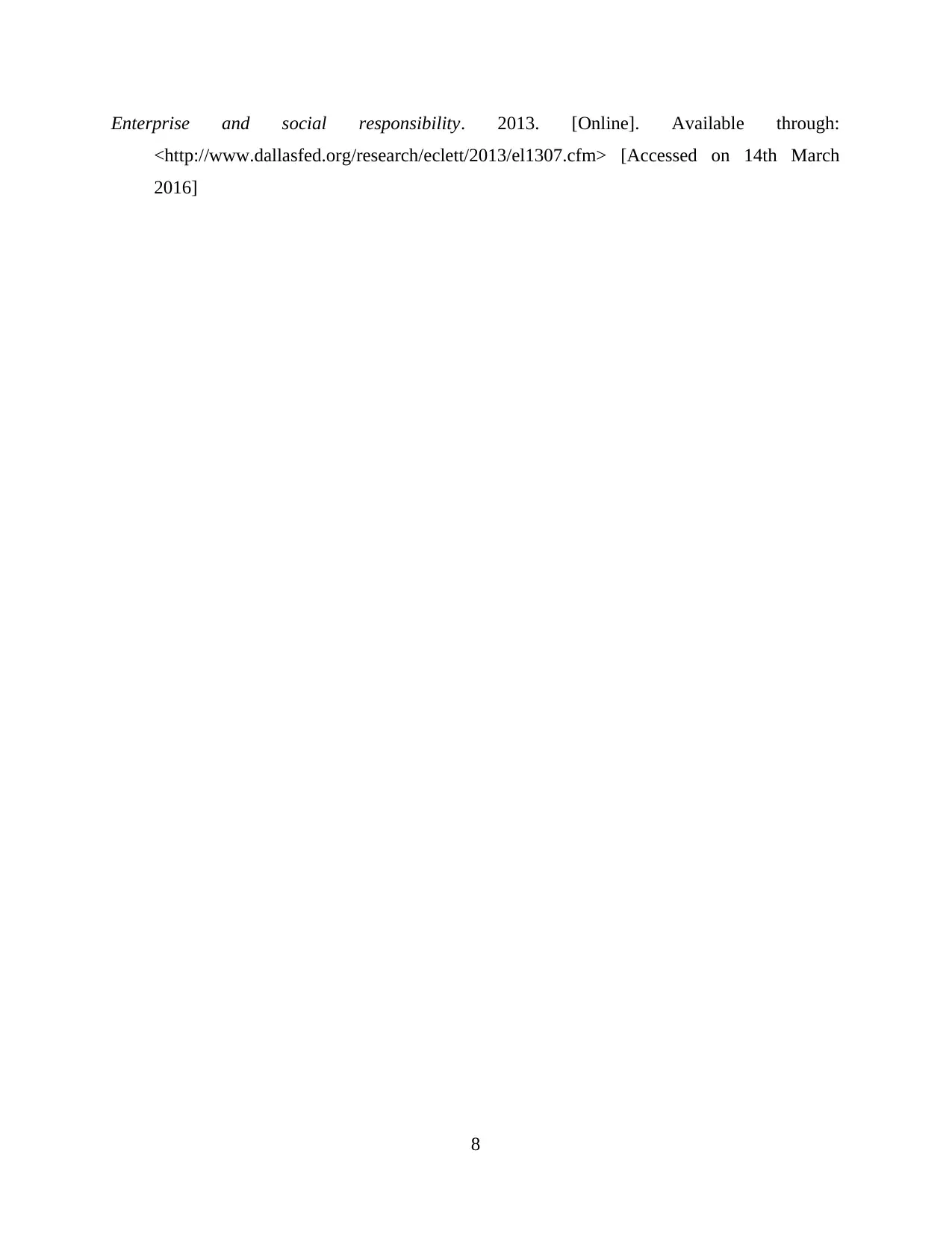
Enterprise and social responsibility. 2013. [Online]. Available through:
<http://www.dallasfed.org/research/eclett/2013/el1307.cfm> [Accessed on 14th March
2016]
8
<http://www.dallasfed.org/research/eclett/2013/el1307.cfm> [Accessed on 14th March
2016]
8
1 out of 10
Related Documents
Your All-in-One AI-Powered Toolkit for Academic Success.
+13062052269
info@desklib.com
Available 24*7 on WhatsApp / Email
![[object Object]](/_next/static/media/star-bottom.7253800d.svg)
Unlock your academic potential
© 2024 | Zucol Services PVT LTD | All rights reserved.





